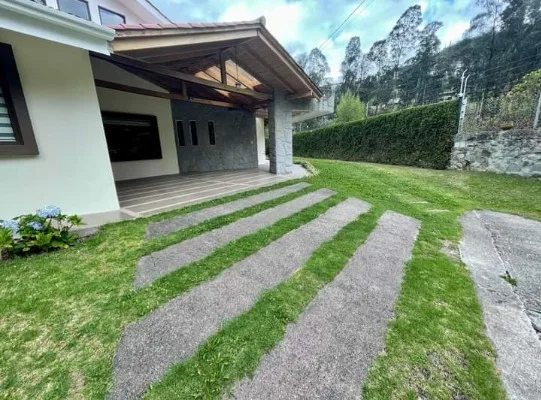Covid deaths are much higher than reported, doctors say; Some students head back to class; High UV warning; Hospitals lack needed opioid meds
Two Quito doctors are urging the government to update its Covid-19 death count based on the number of excess deaths recorded in Ecuador in 2020 and 2021. They claim the Ministry of Health’s 15,400 confirmed virus death total should be increased to 30,000 to 35,000.

Chart indicates Ecuador’s excess deaths during the pademic compared to 2018 and 2019. (El Universo)
“Since the beginning of the pandemic, there have been about 65,000 more deaths than were recorded in 2019,” says Jorge Gonzalez, who was trained as an epidemiologist in the U.S. “Ecuador should follow the lead of Peru, which incorporated many of its additional deaths into the Covid death statistics last month. If we do that, we would see a death total about double of the official count. For many reasons, including that of planning for future outbreaks, we need to use the actual numbers.”
Gonzalez and research colleague Romero Larriva say that 50 to 60 percent of all excess deaths should be attributed to Covid. “Not all of the deaths are from the virus but most of them are,” says Larriva. “We estimate that many of them are the result of people with other serious illnesses not seeking medical attention due the fear of Covid,” he says. “Some are the result of a medical system unable to provide the hospital beds and doctor’s visit that would be available in non-pandemic times.”
Thousands of students return to in-person classes this week
Several thousand elementary and high school students return to the classroom Wednesday for the first time since March of last year. In Cuenca, the staff of the private college-prep Stiehle German School say they expect about 60 percent of its 790 students to be in class this week.
The Ministry of Ecuador has authorized 1,300 private and public schools, less than 10 percent of the country’s total, to resume face-to-face classes on Wednesday. “The resumption of classes will be gradual and voluntary,” the ministry said in a statement. “Online and alternative instruction will continue for parents who are not comfortable returning their children to classes.” The ministry said the June reopening is a pilot project that will provide guidance for a full reopening of all schools in September.

A science teacher in Guayaquil prepares his classroom for reopening this week. (El Universo)
The national Emergency Operations Committee has sanctioned the limited return to classrooms with strict biosecurity measures and says it will closely monitor the results. The medical advisors to the COE say that most teachers returning to the classroom will be vaccinated against the Covid-19 virus and that children are at very low risk. “For most school-age children, the data shows that the risk of being infected with a severe case of Covid is less than that of the common flu,” a COE doctor said.
The education ministry reports that as many as half of Ecuador’s public school children have fallen behind in their education due to the closure of schools. “The online study option is not suitable to many students,” it says.
According to the ministry, 199 urban and 1,102 rural schools are part of the reopening pilot project that begins Wednesday.
Weather forecasters warns of high UV radiation
The National Institute of Meteorology has issued a warning for high levels of ultraviolet radiation for Ecuador’s inter-Andean valley. The institute says UV levels could reach 13 to 16 for areas between Cuenca and Quito and urged residents to take precautions to avoid intense sunshine. “We are entering the dry season, which can mean extended periods of sunshine and low humidity, which result in high UV levels,” the institute said in a statement. It added that the high-UV warning will remain in effect for the week of June 7 to June 12.
New government acknowledges ‘critical’ lack of needed medicine
Ecuador’s new vice president, Alfredo Borrero, said the government will take emergency action to supply Ecuador’s public hospitals with the medicines they need. Administrators at two Social Security hospitals told the vice president Friday visit that they lack a number of medications that are critically needed to treat Covid-19 and other patients.
Following the visits, Borrero said that medicines to relieve extreme pain are in short-supply to the public and IESS hospitals. “Doctors are forced to replace badly needed opioid sedatives and relaxants with less effective medicines and this means the patients suffer,” he said. He added that, in some cases, hospitals are purchasing over-the-counter opioid medications from private pharmacies to treat patients. “These medications are for less severe pain and are not what is required for hospital use in many cases.”
Borrero said he hopes to supply hospitals with the needed medications in June.

















